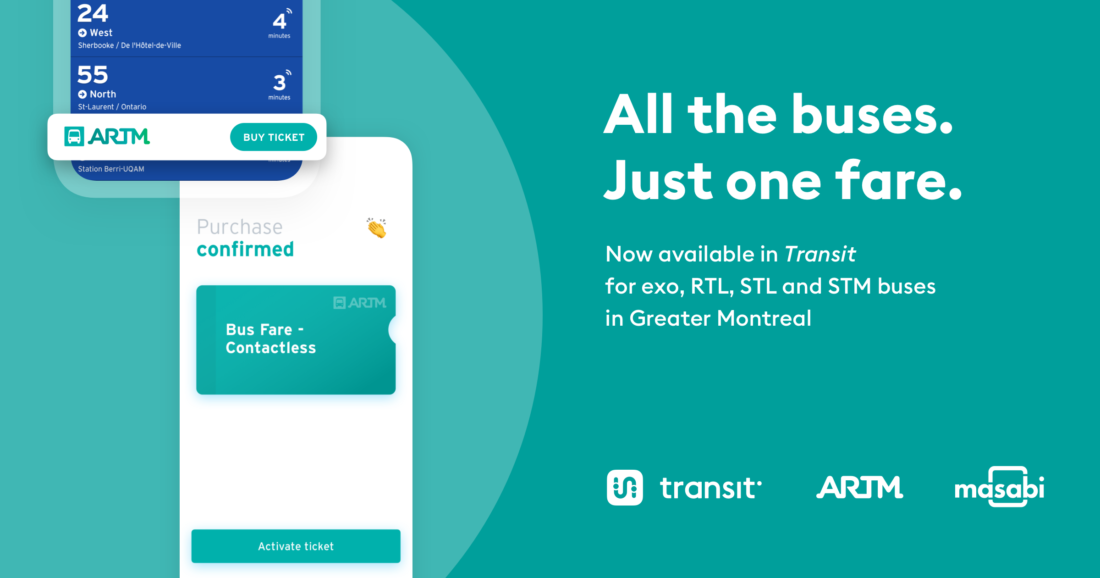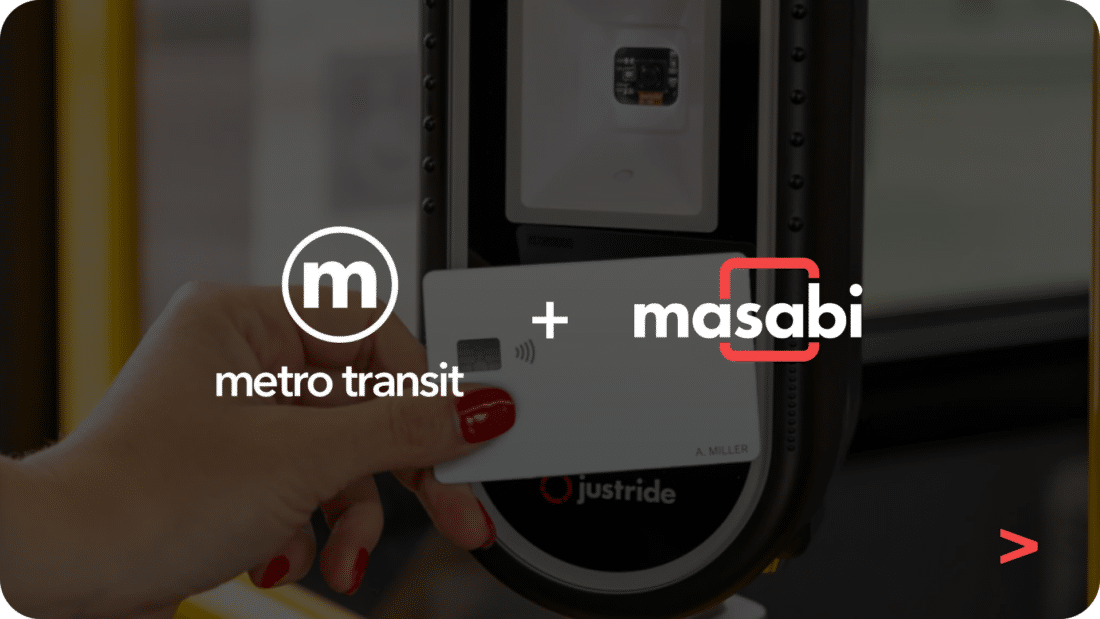
Transit app and Masabi launch Montreal’s first mobile fare solution for ARTM, covering all Montreal-area buses
120-minute bus pass from ARTM, powered by mobile ticketing provider Masabi, joins BIXI bikeshare passes in users’ multimodal Transit Accounts.
Montreal, QC — Transit, North America’s leading mobility app and endorsed app of the Société de transport de Montréal (STM) and Masabi, today launched a new single-ride bus fare from the Autorité régionale de transport métropolitain (ARTM), the Montreal region’s public transit governing authority.
The fare, which includes free transfers during a 120-minute period, is valid on Montreal-area buses operated by the four regional transit agencies: exo, RTL, STL, and STM. This mobile ticketing option in Transit is delivered with Masabi, the company bringing Fare Payments-as-a-Service (FPaaS) to public transit. It marks the first time Montreal transit riders can pay for trips using a mobile phone, and allows Montrealers to purchase bus fares and BIXI bikeshare passes using a single Transit Account.
The new mobile bus fare was created by the ARTM in just a matter of months in response to the coronavirus crisis. This new solution, increasingly popular among North American transit agencies seeking to reassure riders and sustain revenue during the pandemic, gives passengers a payment method that uses visual validation to reduce contact with bus drivers.
Transit’s mobile ticketing integration, already live for two dozen transit agencies across North America, is now available to Transit’s more than 220,000 monthly users across the Montreal region, who rely on the app during the pandemic. The ticketing integration in Montreal is powered by Masabi’s Justride SDK, the world’s first and leading mobile ticketing software development kit (SDK) for public transportation. Transit and Masabi have previously worked together to bring mobile ticketing to transit riders in St. Catharines, Ontario, as well as Las Vegas, Denver, Cincinnati, and St. Louis in the United States.
The new bus fare is also integrated into Transit Accounts, introducing “mobility-as-a-service” to Montreal so riders can purchase a bus-to-bikeshare trip in a single, universal app. Users can not only plan a multimodal trip using the app’s Transit+ feature, they can now also purchase a bus fare from the ARTM, then seamlessly buy a connecting BIXI bikeshare ride with just an extra tap… no extra apps or accounts required.
Transit accounts work whenever users purchase a mobility service in the app, no matter the operator or city, such as boarding a bus in St. Louis, taking a light rail trip to the airport in Denver, or hopping on a bikeshare in Toronto, for a truly universal mobility experience that puts public transit front-and-centre.
“Montreal isn’t just Transit’s hometown. It’s also a city that’s finding new solutions to fare payment during the pandemic, while at the same time bringing together public transit ticketing and bikeshare into a simple, unified app experience for riders,” said Sam Vermette, CEO of Transit. “We’re making it easy to plan and pay for multimodal trips, helping people get from A to B without their own car. Working with transit authorities like the ARTM and new mobility services like BIXI is how we achieve that mission.”
“During the gradual resumption of activities across the Montreal metropolitan area, the region’s bus networks have seen the most significant increase in demand and ridership. While travel habits remain disrupted, this initiative supplements the health measures put in place by the region’s transit operators. It gives users more flexibility to purchase single bus fares that can be contactlessly validated,” said Benoît Gendron, director general of the ARTM. “This project will also help advance the development of a one-stop mobility hub for the user.”
“Social distancing has made mobile ticketing a must-have for transit agencies, and we are delighted to be working with ARTM and our partner, Transit, to enable a best-of-breed mobile ticketing and practical Mobility-as-a-Service solution for travellers in Montreal, and helping passengers and agency staff alike to stay safe,” said Brian Zanghi, CEO of Masabi. “Today, we can deliver market-leading fare payment technology to forward-thinking cities by providing Fare Payment-as-a-Service, in a fraction of the time and at a fraction of the cost of bespoke ticketing systems. By using a multi-tenant platform, which is constantly updating with new features and functionality, we are helping agencies keep up with the pace of technology change.”
“BIXI’s mission is to transform the urban experience with a bikeshare service that contributes to accessible and connected mobility. We’ve been partners with Transit for many years, and aredelighted to be a part of its success, all with the goal of making travel easier and promoting multimodal journeys,” said Christian Vermette, general manager of BIXI Montréal.
###
About Masabi: Masabi is bringing Fare Payments-as-a-Service — a new and better way of delivering fare payments — to public transit agencies and authorities of all sizes around the globe. This enables agencies to receive the latest fare payment innovations quickly, using a platform which is constantly updating and adding new features. Not only does this improve the journey experience for passengers, but it helps agencies keep up with the pace of technology change, while reducing the total cost of fare collection. With over 80 agencies of all sizes across 11 countries signed up, Masabi’s Justride is the world’s leading fare payments platform. Masabi has offices in New York, Denver, London, and Cluj, and investors include Mastercard, Shell, and Keolis. For more information, visit www.masabi.com.
About Transit: Transit solves the urban commute in more than 200 cities worldwide. Users can easily navigate public transit with accurate real-time countdowns, simple trip planning, crowding predictions, step-by-step navigation, and quick, easy payments. The app also integrates additional transport modes — bikesharing, scooters, carsharing and ridehail — so users can mix-and-match their options with public transit to determine the best way to get from A to B. The company is based in Montréal, QC. Learn more by visiting www.transitapp.com.
About the ARTM: The Autorité régionale de transport métropolitain was created by Bill 76, which changed the governance of public transit in the greater Montreal metropolitan area. With a focus on sustainable development and regional cohesion, the ARTM plans, organizes, finances and promotes public transit and paratransit in the metropolitan region of Montreal, in order to offer a simple mobility experience that’s integrated, fluid, and efficient. To this end, it develops a strategic plan, financing policy, a fare framework, and service agreements which govern the development, organization, and financing of these services. To do this, the ARTM mobilizes Montreal’s public transport sector around a unified vision.[2] For more information, visit www.artm.quebec.
About BIXI: BIXI Montréal is a non-profit organization created by the City of Montreal to manage the bike-sharing system in the city. In 2020, the network includes 680 stations (including 70 electric stations), 7,270 regular bicycles and 1,160 electric bicycles in Montréal, as well as in Westmount, Mont-Royal, Montréal East, Longueuil and Laval. For more information, visit www.bixi.com.







